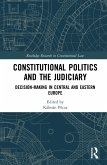Seminar paper from the year 2000 in the subject Law - Comparative Legal Systems, Comparative Law, grade: very good, Jagiellonian University in Krakow (Summer School), course: Poland and Central Europe in Transition, language: English, abstract: Soon after the historical changes that took place in Central and Eastern Europe in 1989, it became clear that any new political, social, cultural and economical system introduced after the fall of communism had to be based on a constitutional system of western type. As it will be pointed later, this does not necessarily mean, that basic ideas and concepts of constitutions like those existing in western Europe were completely unknown in the CEE-countries in communist times. However, the need to find a kind of legal framework to prevent drawbacks on the way to democracy and market-orientated economy as well as the demonstration of the new orientation towards the west made significant changes of the constitutional system even more important. From the very beginning there were two sides to the constitutional aspect of transitions. On the one hand, national problems had to be solved. On the other hand, an international political pressure could be observed, e.g. concerning the protection of human rights. The search for a new legal system was a walk on a fine line between principles and compromises on both internal and international level.
Dieser Download kann aus rechtlichen Gründen nur mit Rechnungsadresse in A, B, BG, CY, CZ, D, DK, EW, E, FIN, F, GR, HR, H, IRL, I, LT, L, LR, M, NL, PL, P, R, S, SLO, SK ausgeliefert werden.









